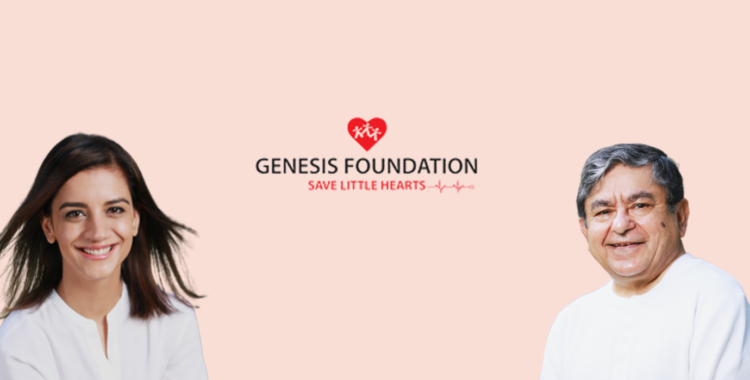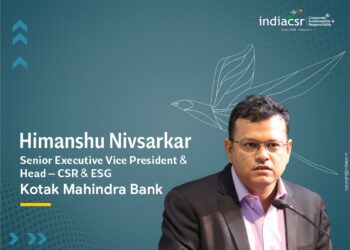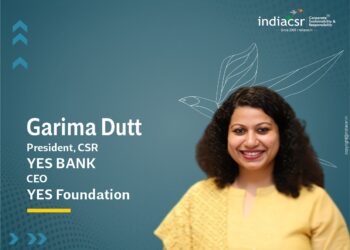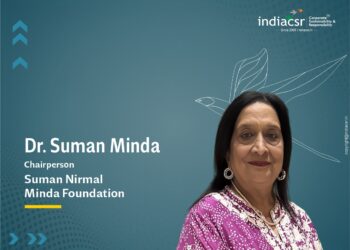Genesis Foundation facilitates medical treatment for critically ill under-privileged children suffering from Congenital Heart Defects. The Foundation has so far supported the medical treatment of over 3100 critically ill children.
India CSR Network interviewed Jyoti Sagar, Founder trustee and Simran Sagar, the Operations Director, to discuss challenges, interventions, achievements and plans. Excerpts:
What is the prevalence of congenital heart defect (CHD) in India?
Jyoti: The extent of this problem in our country is huge. The birth prevalence of CHD is estimated to be 8-12/1000 live births. If we consider an average rate of 9/1000, over 200,000 babies are born with CHD each year in our country.
And then estimates suggest that more than 70,000 of these children require immediate intervention (within the first year). Otherwise, they probably would not even make it to their first birthday.
With over 40% of the births still taking place at home, the baby loses that chance of an early diagnosis.
Where do you find challenges?
Jyoti: The missing links are the limited number of hospitals where these medical interventions can take place. There are just about 50 centres in our entire country. And most of those centres are in Metropolitan towns or tier-one cities. With a few exceptions in tier two cities, there is nothing much in the hinterland, and a lot of it is focused in the southwest and the north, leaving the east very largely poorly served.
Moreover, there are associated costs. Out of the poorest of the poor, how many can afford medical costs, if you go and get diagnosed?
What is the modus operandi of Genesis foundation?
Simran: Our work involves identifying partner hospitals and working with them to see how many children we can reach.
Our partner hospital count stood at 26 all over India. Every partner hospital has a pediatric cardiology department. We get referral cases from these partner hospitals.
We also identify cases through screening camps that we organise with these partner hospitals in remote parts of the country.
We support families whose monthly income is under Rs 15,000. We have defined SOPs with partner hospitals about the kinds of cases we take.
Once a case fits the bracket of Rs 15,000 or below with a congenital heart defect, they receive treatment at our partner hospitals. We are very particular about the kind of hospitals we partner with. They need to have a certain level of infrastructure, training, dedicated staff in place for us to partner with them to make sure that the children that we support get the best outcome possible.
Hence, we pride ourselves on a 98% success rate, through all our surgeries.
What is your next course of action?
Simran: Before I get into the future course of action, I would like to highlight this financial year.
I think needless to say that because we are in this healthcare space, it has been difficult. We have had hospitals turned into COVID hospitals, we’ve had departments that shut down, but our operations have continued. We have continued even amid a complete lockdown to support children. In July 2020, we supported 107 children, which is the maximum number of children we supported in any month ever.
But having said that, given the current situation with rising covid cases, I think we will continue to save as many children as we can with the funds that we have at hand and the CSR relationships that we will continue. The reality of it is some partnerships might not continue, but we do have support in that area.
We are also blessed to have a lot of individual donors and a committee, the team that we have built over the years, who believe in and who have pledged to our cause because that is the sustainability for the time being.
We are planning to increase the number of partner hospitals. But due to the rise of COVID cases, many hospitals, particularly in Maharashtra, are unable to function right now.
So, I think to be realistic, keeping the current situation in mind, as and when the vaccination drive continues, we hope to pick back up again and scale our on-ground operations.
But currently, for the start of the current financial year, I think it’s just taking what we’ve got and continuing at the same pace, staying current with the digital platforms, and seeing what we can do there to raise awareness and fundraise.
How do you plan to scale your operations?
Jyoti: In the space of CHD, scaling up has a different angle.
One is the demand side. We may have just scratched the surface because 608 cases are the maximum we did in a year. And by the way, we were number one in the country. There is no other organisation in this space that works for that many children. And this makes us happy as well as sad. Happy because we are number one, but sad because more work is needed.
If we had more centres and physical facilities, we could start expanding our operations. Because all 50 centres having pediatric heart care facility include government centres as well.
The problem with the government sector centres is that there are waiting lists of seven to eight years, believe it or not, and in most of our cases, the child won’t survive that long to wait for free surgery.
In the private sector, the capacity is still limited. Most of our partner hospitals are working quite a lot to increase capacity.
So, scaling up, in this case, will require attention at both the demand and supply sides























